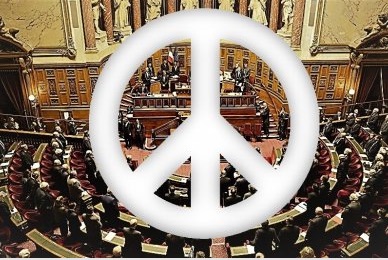DISARMAMENT & SECURITY .
An article by Parliamentarians for Nuclear Nonproliferation and Disarmament
A Parliamentary Action Plan for a Nuclear-Weapon-Free World was released at the United Nations in New York today, during the final few days of UN negotiations on a Treaty to Prohibit Nuclear Weapons. The release of the plan also came one day after the North Korean test of an inter-continental ballistic missile, which has raised the nuclear tensions in the North East Asian region. The Action Plan, which has been developed by Parliamentarians for Nuclear Nonproliferation and Disarmament [PNND] in consultation with the Inter-Parliamentary Union (IPU), includes 14 key nuclear disarmament actions that can be taken by parliamentarians.

Some of these are actions that parliamentarians from States Parties to the forthcoming nuclear prohibition treaty can take to implement the treaty in their parliaments. These are all non-nuclear States, as the nuclear-armed and allied States are not participating in the prohibition treaty.
Other actions in the Plan are those that parliamentarians from nuclear armed and allied States can take to reduce the risks of nuclear weapons being used, and move their governments to adopt incremental disarmament measures, phase out the reliance on nuclear deterrence and negotiate for nuclear disarmament.
And some actions in the Plan are those that parliamentarians from all States can take to build public awareness and political will for the achievement of a nuclear-weapon-free world.
The plan draws from reports and resolutions on nuclear disarmament adopted by the IPU in 2009 and 2014, as well as resolutions of the Parliamentary Assembly of the Organisation for Security and Cooperation in Europe, and a series of consultations undertaken by PNND in key capitals and UN centres during 2016-2017.
Actions by parliamentarians to implement the nuclear prohibition treaty
The Plan encourages parliamentarians from States that join the forthcoming nuclear weapons prohibition treaty, to implement the treaty in their parliaments by prohibiting the threat, use, production, stationing and testing of nuclear weapons in their territories.
Such actions would not impact directly on the policies and practices of the nuclear-armed States, but would reinforce a norm against nuclear weapons.
Impact on the nuclear-armed States: transit and nuclear investments
The Action Plan suggests that States Parties to the nuclear prohibition treaty could also adopt measures that are not specifically required by the nuclear prohibition treaty, but which would would impact considerably on the nuclear armed States. These measures include prohibiting transit of nuclear weapons through their territories (ports, airfields, territorial waters and airspace), and prohibiting the financing of nuclear weapons.
PNND provided information to the UN negotiations on how a national prohibition on transit of nuclear weapons can work, drawing primarily from the experience of the New Zealand nuclear weapons ban. See The Ban Treaty, Transit and National Implementation.
(Continued in right column)
Can we abolish all nuclear weapons?
A UN High-Level Conference on Nuclear Disarmament: Distraction or progress?
(Continued from left column)
PNND has joined with the World Future Council and International Peace Bureau in a project ‘Move the Nuclear Weapons Money’ which provides information about parliamentary actions in nuclear-armed States to cut nuclear weapons budgets and re-direct these funds to economic, social and environmental needs (including protecting the climate); parliamentary actions in non-nuclear States to end investments of public funds and banks in corporations manufacturing nuclear weapons and their dedicated delivery systems.
Other actions by parliamentarians in nuclear armed and allied states
The Action plan includes a number of actions that parliamentarians in nuclear-armed and allied States can take to reduce the risks of nuclear weapons use and advance nuclear disarmament measures. These includes proposals on de-alerting, no-first use, stockpile reduction, verification, transparency, establishing additional nuclear-weapon-free zones, and supporting nuclear disarmament negotiations.
The Plan includes examples of such actions in national parliaments and in inter-parliamentary bodies including the Inter-Parliamentary Union and the Parliamentary Assembly of the Organisation for Security and Cooperation in Europe.
Nuclear-Weapon Free Zones
The Action Plan reports on proposals and parliamentary actions for the establishment of nuclear-weapon free zones in the Middle East, Europe and North East Asia.
The NE Asia proposal is particularly relevant as a possible solution to the nuclear crisis unfolding in the region over North Korea’s nuclear weapons and missile development.
UN High Level Conference on Nuclear Disarmament
The Action Plan focuses on key multilateral forums where parliamentarians can advance nuclear disarmament, including the Non-Proliferation Treaty Review Conferences, and the United Nations.
The Plan highlights the unique opportunity provided by the 2018 UN High Level Conference on Nuclear Disarmament. Similar UN High Level Conferences (HLCs) over the past few years have been very successful in adopting global agreements on sustainable development goals (2015), climate change (2016), refugees and migrants (2016) and oceans (2017).
The 2018 HLC on Nuclear Disarmament could build considerable political will for nuclear disarmament, if governments attend at the ‘highest level’. It could provide a forum to elevate the nuclear prohibition treaty, make progress on nuclear risk-reduction and disarmament measures by the nuclear armed States, and advance regional measures such as nuclear-weapon-free zones in the Middle East and North-East Asia.
Public awareness and political will
The Action Plan also includes a number of actions that parliamentarians can take to increase public awareness and build political will for nuclear disarmament. These include:
– Commemorating key dates including the International Day for the Total Elimination of Nuclear Weapons;
– Endorsing the joint statement of mayors, parliamentarians and religious leaders for nuclear disarmament;
– Supporting peace and disarmament education in schools and communities including through peace parks and museums.